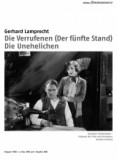| Reviews & Columns |
|
Reviews DVD TV on DVD Blu-ray 4K UHD International DVDs In Theaters Reviews by Studio Video Games Features Collector Series DVDs Easter Egg Database Interviews DVD Talk Radio Feature Articles Columns Anime Talk DVD Savant Horror DVDs The M.O.D. Squad Art House HD Talk Silent DVD
|
DVD Talk Forum |
|
|
| Resources |
|
DVD Price Search Customer Service #'s RCE Info Links |
|
Columns
|
|
|
Die Verrufenen (Der fünfte Stand) & Die Unehelichen
Since 2005, German DVD purveyor Edition Filmmuseum has been picking up on smaller, lesser known vintage films that might perhaps get passed on by Criterion for their Eclipse series. Their library contains not only silents, documentaries and short film collections, but sets devoted to contemporary filmmakers as well (most recently with a set containing work by American indie director James Benning). Like Criterion, their offerings are as nicely presented as possible with clean prints, good scores, multiple subtitle options and booklets containing informative essays on each film.
For Edition Filmmuseum's 77th release, they turn their attention towards the German director Gerhard Lamprecht (1897-1974) with a two-disc set that spotlights a pair of trenchant silent-era message dramas which he also co-scripted. The empathetic, hard-hitting tales told in Die Verrufenene (Der fünfte Stand) (a.k.a. The Slums of Berlin) and Die Unehelichen (a.k.a. Children of No Importance) deal with Germany's disenfranchised in a realistic, gritty manner while still adhering to the melodramatic conventions of the day. Although Lamprect enjoyed a long and varied career behind the camera, he was most active as a passionate movie collector and champion of film preservation. The liner notes accompanying this set make it clear that it's hard to apply the auteur theory to someone like Lamprecht, but these particular films demonstrate handily that the director had a keen interest in the medium. As message pictures, they tend towards the preachy and sentimental, and yet there's also a "try something and see if it works" mentality at play here that makes them of great interest to silent fans.
Die Verrufenene (Der fünfte Stand) (1925; 113 minutes)
A stern indictment of the shabby ways in which society treats it recovering ex-criminal class, Die Verrufenene follows the saga of an engineer recently sprung from prison as he attempts to rebuild his life. Having served out his three-year sentence, Robert Kramer (stone-faced, yet effective Bernard Geotzke) embarks on getting back to work and living a clean, honest life. He finds that getting back into society is more difficult than he bargained for, however, when he is shunned by his father (Paul Bildt) and the wealthy family of his ex-fiancee, Gerda (Hildegarde Imhof). Scraping by in the city slum, working for an indifferent rag maker who prefers to pay in booze over cash, the dejected Robert decides to end it all. He's saved, however, by a kind-hearted prostitute named Emma (Egede Nissen), who shelters the man in the modest apartment she shares with her ne'er-do-well brother, Gustav (Arthur Bergen). Eventually, Robert starts to patch his life back together through the help of Emma (who becomes enamoured with Robert) and a generous old photographer who employs him as an assistant. His world gets upended once again, however, when Gustav is implicated in the murder of one of Emma's clients.
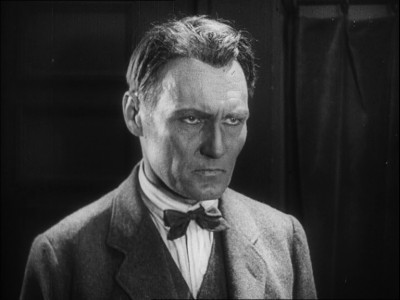
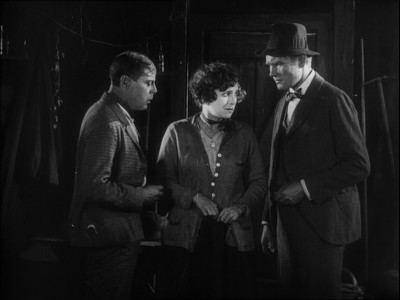
Die Unehelichen (1926; 96 minutes)
If watching a fellow facing indifference/rejection in the slums of Berlin didn't convey enough pathos, Gerhard Lamprect gathered much of the same crew from Die Verrufenene and turned his attention to the city's population of unwanted children for the heart-tugging Die Unehelichen, released the following year. The trio of foster children at the center of Die Verrufenene are survivors who use their own resourcefulness to get by when the kids' guardians and the system itself let them down. Siblings Peter (Ralph Ludwig) and Lotte (Margo Misch) live with another little girl, Frieda (Fee Wachsmuth) under the care of an alcoholic, abusive man named Zielke (Max Maximilain) and his worn-out wife (Margarete Kupfer). Despite the hardships, Peter and Lotte manage to find some pleasure at a local street fair (resulting in some of nicely spontaneous, documentary-like scenes). When Lotte becomes sick and succumbs to pneumonia, however, the other kids are adopted out to other households: Frieda to a loving farm couple, and Peter to a kindly local woman who took pity on him and his sister. Peter isn't situated in a safe, loving home for too long, however, when his father arrives wanting to claim him. The stern-faced bargeman Schiffer Lorenz (played by Bernhard Goetzke, the lead actor from Die Verrufenene) wishes to work the 13 year-old boy on his houseboat, which prompts the frightened Peter to run away.
Taken together,Die Verrufenene and Die Unehelichen serve as decent, typically crafted yet worthwhile silents that paint a vivid picture of 1920s German slum life. If Lamprect seems a bit unsure and stylistically inconsistent as a director (he apparently preferred the stodgy reaction shots that linger a few beats longer than necessary), his work on these two melodramas ultimately succeeds due to the sympathetic, even-handed treatment of all the characters. The protagonists here are victims of circumstance, worthy of our respect, and even the people who are initially portrayed as villains come to realize the wrongs they did. One might be taken aback at first by the stories' manipulative, almost stereotypical "bleeding heart liberal" slant, but Lamprecht never lets the plots - or the dignified characters who inhabit them - dissolve into outright preachiness.
The material in both films appears tailor-made for documentary realism, and yet it's treated more in a melodramatic fashion typical of the era. Lamprecht even gets into flights of fancy in both films, such as when Die Unehelichen's hero, Kramer, fantasizes that he's at a fancy dress ball waltzing with his ex-girlfriend, Gerda. Moments like that enliven Die Unehelichen's standard, drawn-out drama - if anything, Die Unehelichen seems to be a tighter, more accomplished refinement upon what Lamprecht reached for in the previous effort. Not only does he wring out some excellent performances from the young actors playing Peter and Lotte, the set reaches its emotional highlight with Lotte's stylized, gothic deathbed scene (it made me wonder if Lamprecht used Jackie Coogan's similar emoting in Chaplin's The Kid as inspiration). If the rest of Die Unehelichen fails to attain a level of hyper-emotional effectiveness after Lotte's exit midway through, it still works as gritty, uncompromising drama.
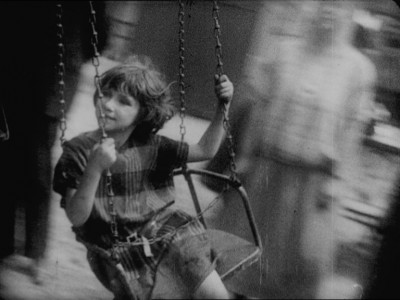
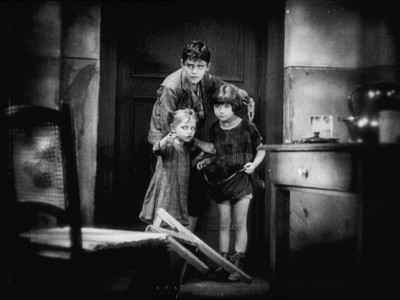
The DVDs:
Edition Filmmuseum's Die Verrufenen (Der fünfte Stand) & Die Unehelichen comes as a Region 0 PAL release which may not play in many American DVD players (they do play in personal computers equipped with a DVD-ROM drive, however, which is how I viewed these discs). The discs are housed in a standard-width transparent hinged DVD case which comes with a nice 15-page booklet containing vintage stills and promotional materials, and a comprehensive essay on Lamprecht (written by historians Rolf Aurich and Wolfgang Jacobsen) printed in German, English and French.
Video:
Die Verrufenen (Der fünfte Stand) & Die Unehelichen utilizes weathered yet complete prints taken from Germany's Deutsche Kinematek. Both films have frequent instances of scratches, specks, missing frames, and mastering that shows some evidence of interlacing. The picture on Die Verrufenen (Der fünfte Stand) is keyed somewhat toward a lighter spectrum, while Die Unehelichen's smoky-edged photography suits its subject matter well. They are projected at a life-like frame rate, however, and are pleasant to watch.
Audio:
Both films in this set have the option of either viewing them in complete silence or with unobstrusive piano scores from composer Donald Sosin. The stereo track has an unassuming yet pleasing mix. The films' original German title cards are supplemented with optional subtitles in English and French.
Extras:
No extras on the discs themselves, but the booklet is an informative plus.
Final Thoughts:
The liberal, message-heavy silent melodramas collected on Die Verrufenen (Der fünfte Stand) & Die Unehelichen expose a side of 1920s German society that one doesn't normally see. Edition Filmmuseum's good presentation sheds a little light on director Gerhard Lamprecht, making it a worthwhile purchase for fans of European silent film. Recommended.
Matt Hinrichs is a designer, artist, film critic and jack-of-all-trades in Phoenix, Arizona. Since 2000, he has been blogging at Scrubbles.net. 4 Color Cowboy is his repository of Western-kitsch imagery, while other films he's experienced are logged at Letterboxd. He also welcomes friends on Twitter @4colorcowboy.
|
| Popular Reviews |
| Sponsored Links |
|
|
| Sponsored Links |
|
|
| Release List | Reviews | Shop | Newsletter | Forum | DVD Giveaways | Blu-Ray | Advertise |
|
Copyright 2024 DVDTalk.com All Rights Reserved. Legal Info, Privacy Policy, Terms of Use,
Manage Preferences,
Your Privacy Choices | |||||||









